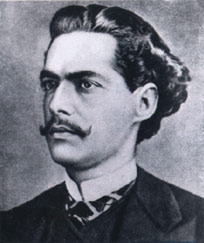- Castro Alves
Infobox Writer
name = Antônio de Castro Alves
image_size=150px
pseudonym = Castro Alves
birthname =
birthdate = birth date|1847|3|14|mf=y
birthplace =Cachoeira ,Bahia ,Brazil
deathdate = death date and age|1871|7|6|1847|3|14|mf=y
deathplace = Salvador,Brazil
occupation =Poet
nationality = Brazilian
movement =Romanticism Antônio de Castro Alves (
March 14 ,1847 -July 6 ,1871 ), more commonly known as Castro Alves (pronounced|ˈkastɾʊ ˈawvɪs), was aBrazil ianpoet best remembered for his abolitionist andrepublican poems, and is considered one of the most important Brazilian poets of the 19th century [cite web| last =Peixoto| first =Afrânio| authorlink =Afrãnio Peixoto|coauthors =|title =Castro Alves| work =| publisher =| date =| url =http://www.culturabrasil.org/castroalves.htm| format =| doi =| accessdate =] .Life
Alves was born in the town of
Cachoeira ,Bahia ,Brazil . In 1862, he entered theFaculdade de Direito do Recife , was involved in an affair with Portuguese actressEugênia Câmara and wrote his first abolitionist poems: "Os Escravos" ("The Slaves") and "A Cachoeira de Paulo Afonso" ("Paulo Afonso's Waterfall"), reading them out loud in public events in defense of the abolitionist cause. Even though many Brazilians stood up against it at that time,slavery in Brazil was not officially ended until 1888, when Princess Isabel, daughter ofDom Pedro II , declared it extinct by means of theLei Áurea ("Golden Law").In 1867, Alves left
Recife and returned Bahia, where he wrote his dramatic play "Gonzaga". He later moved toRio de Janeiro , where he met influential people such asJosé de Alencar ,Francisco Otaviano andMachado de Assis , from whom he got moral support.Alves headed south to
São Paulo to take courses at Sao Francisco Law School. While there he met important writers and politicians, such asRui Barbosa ,Joaquim Nabuco , Rodrigues Alves,Afonso Pena andBias Fortes . OnNovember 11 1868 , while hunting in the surroundings of São Paulo, he was shot in the left ankle, which led to the amputation of his feet. Soon afterwards Alves contractedtuberculosis , a very common disease in São Paulo at that time due to the dark and untidy pubs around town and chilly weather, which forced him to return to his home land, Bahia. He died onJuly 6 ,1871 , in the city of Salvador.Poetry
Alves's work stands in the late-Romantic aesthetic and is deeply influenced by the work of the French poet
Victor Hugo in a movement called "condoreirismo", which is marked by the introspection of the Romantic period with a social and humanitarian concern. These concerns led him to the incipient Abolitionism and Republicanism, of whose causes he was one of the foremost representatives.His poetry is more optimistic in tone than early romantic poets, and is marked by more sensual and physical images than is usual to the Romantic Aesthetic. He was not attached to the (sometimes official) indigenism shown by José de Alencar or
Gonçalves Dias , nor had the mal-du-siècle aesthetic ofÁlvares de Azevedo . As a result of this, his work is usually considered to be late-romantic, tending to the later Realist movement.Among his best known works are: "Espumas Flutuantes" ("Floating Foams"), "Gonzaga ou A Revolução de Minas" ("Gonzaga or the Revolution of Minas"), "Cachoeira de Paulo Afonso", "Vozes D'África" ("Voices from Africa"), "O Navio Negreiro" ("The Slave Ship").
References and notes
External links
* [http://www.colegiosaofrancisco.com.br/novo/literatura/castro/castro.html Castro Alves (vida e obras)]
* [http://www.biblio.com.br/conteudo/CastroAlves/CastroAlves.htm] Biography.
* [http://www.ordemlivre.org/node/357 O Navio Negreiro]Persondata
NAME=Alves, Castro
ALTERNATIVE NAMES=Alves, Antônio de Castro (full name)
SHORT DESCRIPTION=Brazil ianpoet
DATE OF BIRTH=March 14 ,1847
PLACE OF BIRTH=Cachoeira ,Bahia ,Brazil
DATE OF DEATH=July 6 ,1871
PLACE OF DEATH=Salvador,Brazil
Wikimedia Foundation. 2010.
